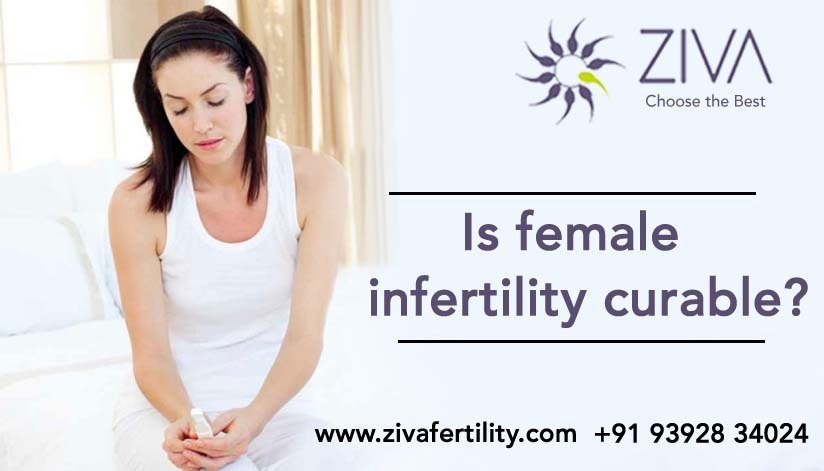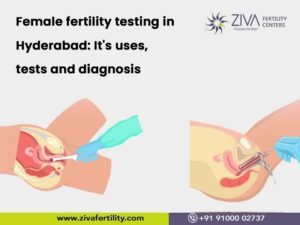Infertility is diagnosed when a partner is unable to get pregnant even after a year of unprotected sexual intercourse. When the cause of infertility is attributed to women, it is called female infertility. Of all cases reported for infertility, nearly 40% of cases fall into the female infertility category.
Female infertility is the inability to get pregnant or keep a fetus in the uterus. Both men and women can be held responsible for infertility. Female infertility treatment is essential for those trying to get pregnant but are still unsuccessful despite having had unprotected sex for more than a year. This is why couples need to seek adequate medical care.
This blog gives information about infertility treatment in women.
How does age affect fertility in women?
Females have a limited number of eggs since birth. As the reproduction process occurs, the number and quality of eggs decrease. It is estimated that the chance of having a baby decreases by 3% to 5% per year after the age of 30. This decrease in fertility is seen to be much more significant after the age of 40.
Causes of Infertility – Leads to the treatment of female infertility.
Female infertility caused by various health problems. Some causes of female infertility are:
- Damage to the fallopian tubes: The fallopian tubes carry eggs from the ovaries to the uterus. When damaged, they prevent contact between the egg and sperm. Some major diseases and surgeries, such as pelvic infections, endometriosis, and pelvic surgery, can cause scarring and also damage to the fallopian tubes.
- Irregular hormonal changes: Many women experience various problems during ovulation. The most common is releasing an egg from the ovary and a thickening of the endometrium (uterine lining) to prepare a fertilized egg. Problems can be detected using a body temperature chart, ovulation prediction kits, and blood tests to detect hormone levels.
- Cervical Problems: Some women have cervical cancer; hence the sperm cannot pass through the cervical canal. This is due to a build-up of mucus, or any previous surgery to this area results in a blockage.
- Epileptic: Studies have shown that reproductive disorders and infertility are two to three times more common in epileptic women. This is because epileptic seizures can lead to increased serum prolactin levels and fluctuations in female reproductive hormones. It is reported that about 50% of the female population suffers from menstrual disorders and a higher frequency of irregular ovulation cycles, which are detrimental to problems with pregnancy or infertility. New methods of treating female infertility can help prevent problems or complications during pregnancy.
- Endometriosis: This occurs when endometrial tissue grafts and grows outside the uterus, interferes with the function of the ovaries, uterus, and fallopian tubes, causes complications during pregnancy and is a significant cause of female infertility.
- Uterine fibroids: In this case, the uterine structure is not suitable for the fetus. The presence of polyps and fibroids causes this. Their abnormal growth can affect about 70-80% of women over the age of 50. Uterine fibroids are non-cancerous lumps that develop inside or outside a woman’s uterus that cause heavy bleeding during pregnancy, frequent urination, painful sex, and infertility in women.
- Polycystic Ovarian Syndrome (PCOS): This is a condition caused by hormonal imbalances in a woman’s reproductive system, which results in decreased egg production, making it less likely to get pregnant.
- Unexplained Cause: Unexpected infertility occurs when the cause is unclear or cannot be identified, resulting in 20% of infertility cases. Diagnosing and analyzing other such issues requires more advanced methods of treating female infertility.
Can Female Infertility Be Cured?
Some protocols for treating female infertility are listed below:
- Hormonal supplements can be given to treat hormonal imbalances
- The same can be used to treat endometriosis or irregular menstrual cycles
- In the absence of ovulation, it can be stimulated with the help of drugs
- Several supplements are known to increase fertility.
If there are any blockages, they can be removed by performing several operations. After the blockage is removed, the chances of getting pregnant increase significantly.
Treatment of female infertility
- Assisted Reproductive Technology, or ART: This is one of the most popular treatment options available. This is carried out through a combination of fertility drugs and hormone therapy. The drug, called Clomiphene or Clomid and Serophene, is a highly recommended treatment for fertility problems. Other types of tests include in vitro fertilization, intrauterine insemination.
- In Vitro Fertilization: This is a complete and sophisticated procedure to support sperm and egg cells. IVF is an artificial fertilization technique in which an egg and sperm combine outside the body and enter the uterus after an embryo is formed. This procedure was first introduced in 1981 and has been used successfully to give birth to more than 200,000 babies.
- Medical therapy: Women with ovulation problems can be given certain drugs. Gonadotropins are also used for unexplained infertility.
- Intrauterine insemination: This is another procedure that uses small amounts of concentrated sperm. It is painless and takes a few minutes.
- Egg donation: Egg donation is the process of removing eggs from the ovaries of women who have taken fertility drugs to stimulate the ovaries.
- Surrogacy: In surrogacy, the surrogate mother is fertilized with sperm by the recipient partner. The surrogate mother then picks up the baby and gives birth on behalf of the recipient.
- Surgery: After a thorough medical history, physical exam, and ultrasound, your doctor may recommend surgery to correct the disorder. The most common surgical interventions in reproductive medicine are laparoscopy, hysteroscopy, and abdominal myomectomy (removal of uterine fibroids).
Conclusion:
In conclusion, treatment for female infertility is indeed a necessity for women who are determined to become pregnant and want to have a family. Pregnancy and childbirth require proper care. Although female infertility and IVF are related, choosing the right clinic can be a step in that direction.
Ziva Fertility Clinic is known for providing high-quality care for patients with infertility problems. It is equipped with modern infrastructure, modern technology and modern laboratories. As a result, we currently have several cases of successful treatment of patients with advanced infertility problems such as endometriosis, fallopian tube obstruction, severe male infertility problems, etc.
You can contact Ziva Fertility Clinic about your female infertility, know about IVF treatment options, and get advice from an experienced and internationally certified fertility specialist on 9392834104.
















